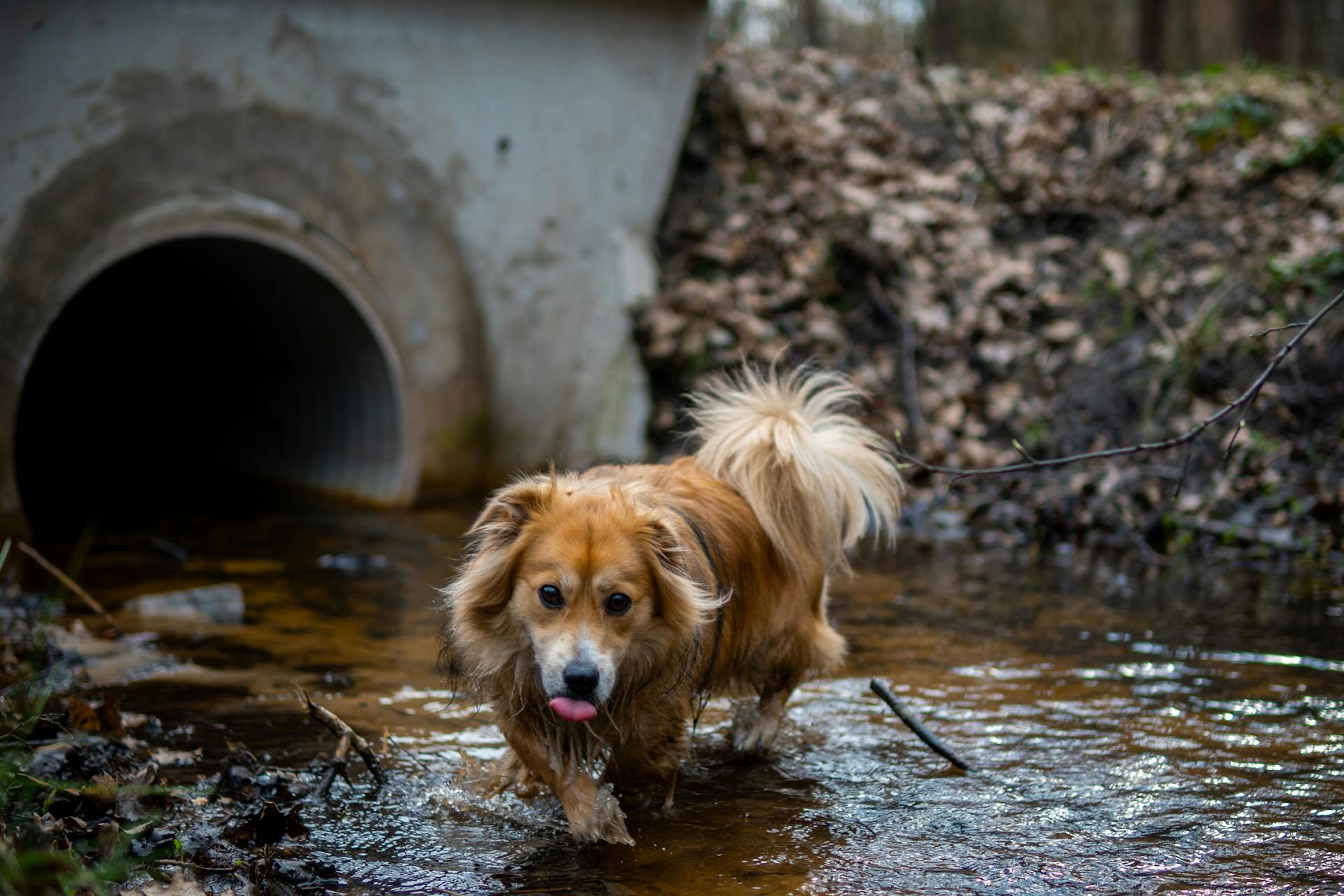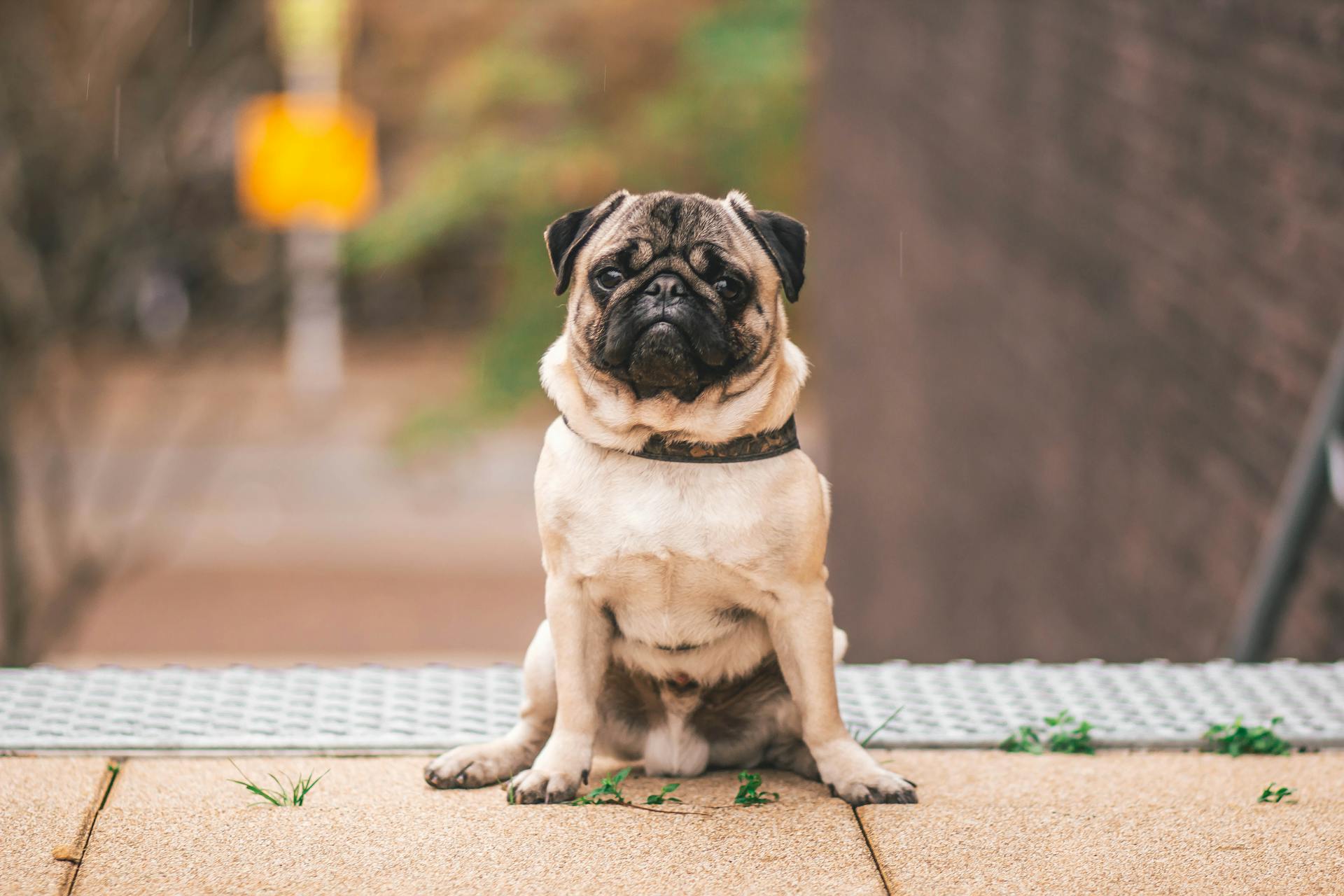
On average, a Peekapoo's lifespan is between 12-15 years, but with proper care and attention, some have been known to live up to 18 years.
Regular grooming is crucial for Peekapoos, as their coat requires daily brushing to prevent matting and tangling.
A Peekapoo's small size means they require moderate exercise, but they still need daily walks and playtime to stay happy and healthy.
For your interest: Black Peekapoo
Breed Facts
The Peekapoo breed has a fascinating history, and understanding its origins can give you a deeper appreciation for this lovable companion animal. The Peekapoo is a hybrid breed, a cross between a Pekingese and a Poodle.
They're relatively small dogs, typically weighing between 6 and 20 pounds, depending on the size of the Poodle parent. Peekapoos are known for being intelligent, affectionate, and loyal dogs.
One of the best things about Peekapoos is their adaptability. They can thrive in a variety of living situations, from apartments to homes with yards. Peekapoos are generally good with children and other pets, making them an excellent choice for families.
Take a look at this: Cavalier Dog Breed Lifespan
Here are some key breed facts to consider:
- Country of Origin: United States
- Breed Group: Hybrid (Pekingese x Poodle)
- Height: 6-11 inches
- Weight: 4-20 pounds, depending on the size of the Poodle parent
- Lifespan: 12-15 years
- Average Price: $600-$1,200
- Hypoallergenic: Yes (often, depending on the coat type inherited)
- Shedding: Low to moderate, depending on coat type
- Good with Kids: Yes, best with older children due to their small size
Their lifespan is typically between 12-15 years, which is a significant consideration for many potential owners.
Health Concerns
Peekapoos are generally healthy dogs, but like all breeds, they can be prone to specific health conditions.
Some common health issues seen in Peekapoos include patellar luxation, eye problems such as cataracts and glaucoma, and heart disease.
Regular check-ups with a veterinarian can help manage these potential health concerns and prevent problems from arising.
To keep your Peekapoo healthy, provide them with proper nutrition, exercise, and preventive care.
A quality diet tailored to your dog's needs will help them stay healthy and prevent problems such as obesity.
Exercise is essential for all dogs, but especially for small breeds like the Peekapoo, as it helps prevent joint problems.
Here are some specific health conditions that can affect Peekapoos:
By being aware of these potential health concerns and taking steps to prevent them, you can help your Peekapoo live a long and healthy life.
Exercise Needs
Peekapoos are energetic dogs and require daily walks to keep them healthy and prevent boredom.
A short walk or play session each day will suffice to keep your Peekapoo happy and healthy.
They are well-suited to indoor activities, making them a great choice for apartment living.
Daily walks are essential to prevent overheating, especially in hot weather, due to their susceptibility to respiratory problems.
It's also essential to supervise their activities to prevent injuries, such as playing too rough or jumping from heights.
Their moderate energy level means they can keep up with you on walks, jog, and hikes, but be sure to take regular breaks to avoid exhaustion.
A moderate walking session once a day is enough to keep your Peekapoo happy and healthy, and they'll love the quality time with you.
Grooming Needs
Peekapoos require regular brushing to prevent matting, especially those with Poodle-like coats.
Their coat type largely determines their grooming needs, with some requiring more attention than others.
Professional grooming every 4 to 6 weeks is a must for those with more Poodle-like coats.
Regular ear cleaning is essential for all Peekapoos, regardless of their coat type.
Nail trimming and dental care are also crucial for their overall health and well-being.
Daily grooming with a pin brush helps prevent matting, making it a vital part of their care routine.
Bathing them once every month or two helps remove loose hair trapped in their coat, keeping them looking and feeling their best.
Temperament and Lifespan
A Peekapoo's temperament is truly one of a kind - they're intelligent, loving, and loyal companions.
They're also known for being low-shedding and hypoallergenic, making them a great choice for people with allergies.
Peekapoos typically live between 10 to 15 years, which is a relatively long lifespan for a small dog breed.
Regular checkups with the vet and proper preventive care can help ensure your Peekapoo stays healthy and lives a long life.
Temperament
Your Pekeapoo's temperament will be a unique blend of their Pekingese and Poodle parents.
Pekingese are known for being fiercely loyal, despite their small size, and were even used as personal protection devices in ancient Chinese imperial courts.
They're also independent thinkers, which can sometimes make them seem a bit opinionated.
Poodles, on the other hand, are highly trainable due to their intelligence, but can be high-strung at times.
Toy and miniature Poodles are people pleasers at heart and are more athletic and agile than they appear.
As a result, your Pekeapoo will likely have a mix of both breeds' personality traits, making them an individual.
The breeder you choose should have carefully selected the parent dogs to ensure a balanced temperament for your puppy.
Check this out: How Long Does a Pekingese Dog Live
Dog Lifespan
A Peekapoo's lifespan is relatively long, typically ranging from 10 to 15 years.
They are generally healthy dogs, but like all breeds, they can be prone to specific health conditions.
Patellar luxation, eye problems, and heart disease are some of the most common health issues seen in Peekapoos.
Regular vet checkups and vaccinations are essential to help prevent these problems and keep your Peekapoo healthy.
Proper nutrition, exercise, and preventive care are key to helping your Peekapoo live a long and healthy life.
Exercise is particularly important for small breeds like the Peekapoo, as it helps prevent joint problems.
A quality diet tailored to your dog's needs will help prevent obesity and other health issues.
Featured Images: pexels.com


